Prologue
At the heart of human endeavor lies an unyielding drive to discern order within the chaos of existence. From the earliest days, our species has thrived on an innate ability to recognize patterns, a fundamental skill that has shaped our evolution and enabled our survival. This ancient propensity is mirrored in the methodical universe where mathematical laws govern everything from the minute particles to the sprawling galaxies. Yet, as much as we unravel the universe’s complexities, the true language of reality remains a tantalizing mystery—perhaps one that even transcends our current understanding and awaits disclosure by civilizations beyond our own. Our journey through the cosmos is not merely about understanding the physical world but also about exploring the moral landscapes we navigate. As our ancestors formed societies, they developed ethical codes influenced by both instinctual behavior and the structured interactions within their communities. These moral frameworks, refined through countless generations, underpin our current societal norms and ethical debates. Yet, this exploration is not anchored in the belief in a preordained moral universe but rather in a recognition of the subjective frameworks we construct to imbue our lives with meaning and order.
Tracing Order – From Universal Laws to Human Insights
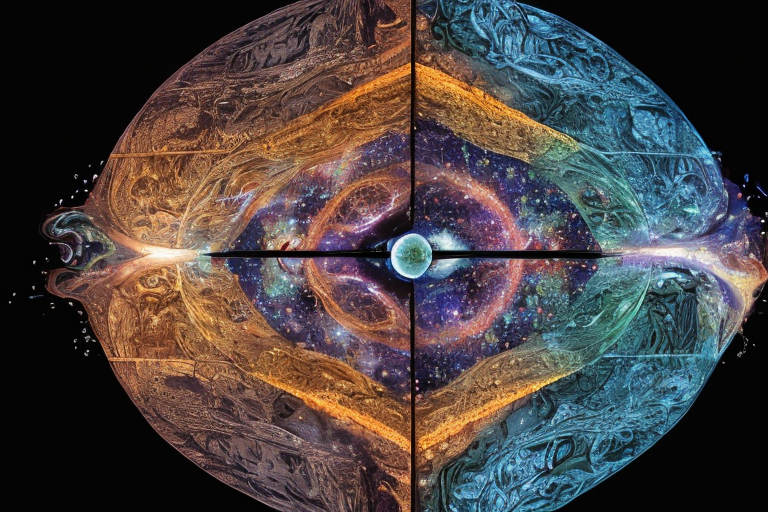
Our innate sensitivity to patterns has significantly contributed to our survival as a species. We instinctively seek connections, recognize coincidences, note regularities, and ascribe significance, though not always through a process of deliberate analysis that identifies clear facets of reality. Often, our pattern recognition stems from an emotional desire to impose order on the chaos of our experiences.
Scientists frequently discuss mathematical equations as if they govern all physical processes in the universe, from quarks to cosmic expanses. It’s conceivable that these mathematical principles are intrinsically woven into the fabric of reality. Engaging with these equations on a daily basis can certainly reinforce that perception. Even as a non-scientist, I assert confidently that nature adheres to laws and that the universe operates according to predictable patterns. Our most precise scientific laws are encapsulated in the equations of modern physics, which have been rigorously validated through careful experimentation and observation. Yet, there remains the possibility that these equations do not reflect the universe’s fundamental language. It is intriguing to imagine that, in presenting our mathematical descriptions to hypothetical alien visitors, they might acknowledge our efforts before revealing a more profound universal language of their own.
The physical intuitions of our ancestors were shaped by direct interactions with the natural world, from the impact of falling rocks to the dynamics of flowing streams. These experiences underscored the survival benefits of understanding basic physical mechanics. Over time, we have extended these intuitive understandings through the application of our cognitive abilities, exploring patterns that range from the microscopic interactions of particles to the vast assemblies of galactic clusters. Many of these patterns, though not directly linked to survival, have been illuminated and codified through our curiosity and the mathematical language that frames our scientific inquiries. Consequently, the equations we derive may be immensely useful for probing the deep structures of reality, yet they could also be constructs of the human mind.
Our predispositions—shaped by natural selection—guide our responses to various ideas and behaviors. Globally, behaviors such as nurturing the young are universally upheld, while practices like incest are universally condemned. Fair dealings and loyalty within familial and community settings are highly valued. As our ancestors formed increasingly complex social groups, these innate inclinations interacted with their immediate social environments, fostering feedback loops that influenced group dynamics and led to the development of communal behavioral norms. These norms, in turn, varied in their evolutionary benefits to the group’s survival. Just as natural selection refined our physical intuitions, it also molded our intrinsic moral and ethical sensibilities.
Among those who agree that moral frameworks are not divinely ordained nor exist within an abstract plane of truth, vigorous debate persists on how human cognition has shaped these early ethical intuitions. Some argue that evolutionary processes have embedded a basic moral sense within us, similar to our understanding of physics, but our advanced cognitive abilities have enabled us to expand beyond these instincts to develop distinct personal beliefs and attitudes. Others contend that our intellectual agility allows us to craft narratives that rationalize our moral choices, though these narratives may simply be sophisticated justifications rooted deeply in our evolutionary history.
It is important to reiterate that these discussions do not depend on traditional notions of free will. In analyzing human behavior, we consider a complex mix of factors, including instinct, memory, perception, and societal norms. Yet, these high-level explanations, which help us navigate our existence, are ultimately underpinned by the fundamental dynamics of nature’s elements. We are all collections of particles, shaped by countless evolutionary struggles that have enhanced our behaviors and given us the ability to resist the natural decay of entropy. However, these evolutionary victories do not bestow upon us any control over the physical laws that dictate the progression of the universe. Our desires, judgments, and moral assessments do not alter the course of nature; they are merely part of the universe’s physical unfolding, governed by its impartial laws.
This understanding leads us to describe universal progression through impersonal mathematical laws, detailing the development of the cosmos from one moment to the next in precise symbolic form. Before the advent of complex life capable of introspection, this narrative encapsulated the entire story of existence. Now, equipped with a deeper understanding, we recount a more nuanced version of this cosmic history, albeit briefly and with a hint of anthropomorphism for clarity’s sake.
Approximately 13.8 billion years ago, a highly ordered field of inflationary energy within the expanding universe suddenly collapsed. This event ceased the repulsion of gravity, filled the cosmos with a sea of particles, and initiated the formation of the simplest atomic nuclei. In regions where quantum fluctuations created slightly denser concentrations of this primordial bath, gravitational forces became stronger, pulling particles into increasingly dense clusters. This process led to the creation of stars, planets, moons, and other celestial bodies. Within stars, and occasionally through the cataclysmic collisions of these stellar bodies, simple nuclei fused into more complex atomic forms. These materials, falling onto nascent planets, were shaped by molecular evolutionary forces into self-replicating structures. Variations in these molecular structures that enhanced their ability to proliferate became predominant. Over the millennia, through the relentless engine of Darwinian evolution, these rudimentary life forms evolved into increasingly complex, self-sustaining organisms.
At the deepest levels we have explored, reality appears to consist solely of particles and fields, governed by physical laws set in motion by initial conditions. These fundamental elements interact within a quantum mechanical framework, where laws dictate outcomes with probabilistic certainty, defined strictly by mathematical principles. In this schema, particles and fields operate devoid of any concern for meaning, value, or significance; they simply follow the indifferent march of mathematical progression, even when this progression gives rise to life. Despite life’s complexity, it does not, and cannot, alter or influence the immutable laws that govern it.
However, what life does achieve is the orchestration of particles into complex, coordinated behaviors that are novel compared to those of the inanimate world. For instance, both roses and rocks are bound by the same natural laws, yet roses thrive, grow, and seek the sun, while rocks remain inert. Evolution, through natural selection, molds the behavior of living organisms, promoting actions that enhance survival and reproduction. The pinnacle of this evolutionary journey is the development of thought.
The ability to remember, analyze, and predict is a formidable tool in the evolutionary arsenal, enhancing survival across countless generations and leading to the emergence of species capable of self-awareness. These species, though constrained by the laws of physics, exhibit a vast array of internal and external behaviors that inanimate objects cannot.
The advent of language marks a profound leap for such self-aware beings, enabling them to transcend immediate survival needs and contemplate their existence within the continuum of time. This reflective capacity shifts their focus from mere survival to seeking understanding and context—pondering not just how to survive, but why survival matters. This quest for meaning drives humans to construct narratives about the universe’s origins and its eventual demise, to create myths and stories that traverse both real and imagined worlds.
We envision realms inhabited by ancestral spirits or deities, transforming the concept of death from an end to a mere transition within a broader existential narrative. Our cultures are rich with art, music, and rituals that not only celebrate these metaphysical ideas but also serve to solidify social bonds and enhance communal survival. While some may argue that these cultural expressions are simply extensions of evolutionary advantages, they undeniably fulfill a deeper human desire to connect with something greater than oneself, to find purpose and place within a universe that, at its core, lacks inherent meaning.
Thus, human behavior transcends the survival imperative, driven by an innate longing to imbue life with lasting significance. Whether through storytelling, which primes the mind for unexpected challenges; art, which fosters creativity and innovation; or religion, which unites communities under shared beliefs, these activities reveal a universal human inclination to reach beyond the basic necessities of existence. They underscore our collective yearning to be part of a legacy that outlives our ephemeral presence, crafting a narrative that aspires to transcend the indifferent mechanics of nature.
Humanity’s Struggle with Mortality and the Desire for Permanence
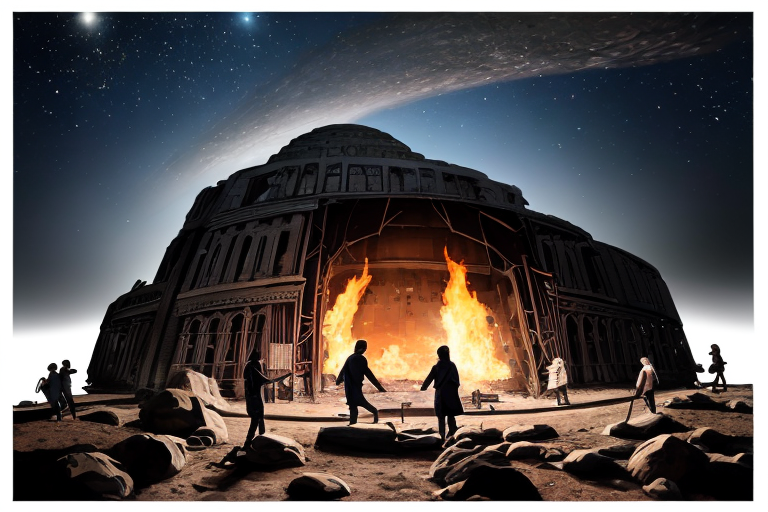
While Gottfried Leibniz famously pondered the existential query of why there exists something rather than nothing, a more intimate conundrum confronts self-aware beings such as ourselves, who ultimately confront their own dissolution into nothingness. Acquiring a temporal perspective reveals the unsettling truth that the vibrant consciousness animating each mind is destined to cease.
In some of my previous essays, I have delved into the expanse of time from our current understanding of its origins to speculative futures. Of course, our comprehension of both past and future is subject to evolve, with some nuances being refined and others potentially overturned. Nonetheless, the enduring cycle of birth and death, the emergence and disintegration of forms, and the continual process of creation and destruction play out across time. Governed by the twin forces of entropy and evolutionary selection, this journey from order to chaos constructs elaborate structures, but whether it concerns stars or black holes, planets or people, molecules or atoms, all entities ultimately disintegrate. The fact that everything ends, including life and consciousness within the universe, is a typical, long-term outcome governed by physical laws—the only novelty being our awareness of this fate.
A common, though contentious, hope held by some is the notion that humanity would fare better if death were eliminated from the equation. This concept has been explored from ancient myths to modern fiction, often with less-than-ideal outcomes. Philosophers have also navigated these waters, providing systematic evaluations of a hypothetical immortal existence. Some argue that infinite time would eventually fulfill every possible desire, leading to ennui in the face of an endless, monotonous existence. Others suggest that immortality would strip life’s decisions, such as how to spend one’s time or choose companions, of their meaningful consequences. Errors would lose their weight, as any poor decision could simply be rectified given the vast swathes of time. Additionally, the sense of achievement might diminish; those with limited potential might face perpetual stagnation, while those capable of endless improvement might find their accomplishments trivialized by the certainty of continual enhancement.
Thus, the discourse surrounding life without death unveils profound insights into the human condition, where the specter of mortality deeply influences our values, our ambitions, and our very understanding of significance.
Despite these philosophical concerns, I propose that humans could potentially adapt to become perfectly acclimated immortals, should such a condition ever be achievable. Our needs and capacities might evolve so significantly that our current measures of engagement and motivation could become irrelevant. If eternal contentment required a novel form of fulfillment, humanity would undoubtedly create, discover, or cultivate it. This speculation, admittedly based on intuition rather than evidence, challenges the narrow perspective that immortality would inevitably lead to ennui. While science steadily progresses toward extending human lifespans, true immortality appears to be unattainable. Yet, contemplating eternal life sharpens our appreciation for the finite lives we lead. Imagining an immortal existence helps illuminate the significance of our mortal lives, where every decision, experience, and endeavor is framed by the scarcity of time. This isn’t to suggest that we live each day with a frantic sense of urgency, but rather that an awareness of life’s brevity instills our actions with intrinsic value—a perspective vastly altered in a hypothetical world where time is limitless. Our choices in education, career, risk-taking, relationships, and family, as well as our broader life goals and worries, are all profoundly shaped by the understanding that our time is finite.
This recognition of life’s temporal limits informs our individual responses, yet it also highlights a collective human trait: a deep, often implicit desire for continuity through our descendants. There’s a pervasive aspiration among us to leave a legacy, to ensure that future generations can build upon the foundations we’ve established, continuing the narrative long after we’ve departed. This desire for legacy reflects a universal value transcending individual existence, anchoring our actions and choices in the desire to contribute to a story that outlasts our own lives.
Balancing Mortality and the Quest for Legacy
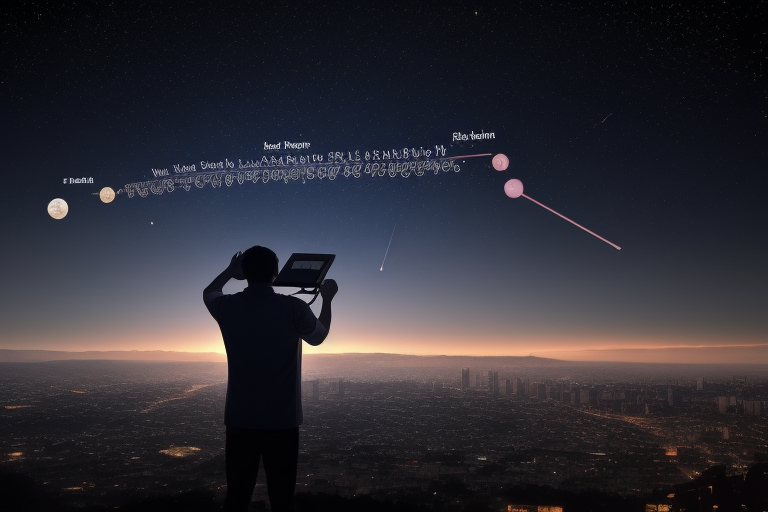
Which would impact you more profoundly: being informed you have only a year to live, or learning that the Earth will be destroyed in a year? Terminal prognoses provoke diverse reactions—sharpening focus, shaping perspectives, evoking regret, inciting panic, bringing peace, or sparking revelations. Personally, the notion of Earth and all humanity facing imminent destruction renders all endeavors seemingly futile. In contrast, my own mortality intensifies life’s moments, lending significance to experiences that might otherwise blend into the mundane. Yet, the prospect of our species’ extinction tends to strip away meaning, highlighting the futility of individual efforts.
This dichotomy illustrates how personal mortality can enrich life’s value, whereas the potential immortality of the species appears essential to preserve it. Philosopher Samuel Scheffler has examined this phenomenon, questioning how one might react if they knew humanity would vanish shortly after their own death. Scheffler’s findings, aligning with my observations, suggest that our lives, actions, and values gain meaning from the assumption that human life will continue long after we are gone. We depend on the future of humanity to lend weight to our own existence, securing our actions and choices within a framework that anticipates a human presence beyond our personal timelines.
Engaging in creative and scholarly activities connects us to a vast and enduring human dialogue. My contributions may not be entirely novel, but they immerse me in ongoing cultural and intellectual exchanges. While hypothetical doomsdays provide a tangible framework for understanding, they remain abstract given the immense timescales involved. It feels reasonable to confront existential threats with urgency when destruction seems imminent, but distant catastrophes, spanning billions of years, challenge our comprehension and feel less pressing—time’s relative vastness diminishes the immediacy of such threats.
Our existence is transient and fleeting. Yet, recognizing the rarity and marvel of our moment in time transforms life’s ephemeral nature into a source of profound value and gratitude. We may yearn for enduring legacies, but a deep understanding of the cosmic scale reveals the improbability of such permanence. However, this understanding also highlights the extraordinary nature of our existence—a brief, vibrant flash in the cosmos where a confluence of particles can contemplate their brief spark of existence, create beauty, foster connections, and explore the mysteries of their reality.
This recognition of our limited time shapes not only how we perceive our personal journeys but also underscores a collective desire for continuity through our descendants. Our hope is that future generations will extend the narrative we have helped shape, ensuring that our fleeting presence contributes to a larger, enduring story.
Crafting Meaning in a Cosmic Expanse
Most of us navigate daily life with quiet resilience, often sheltered by civilization from the stark reality that the world will continue with scarcely a pause after we are gone. We engage deeply in what we can influence: building communities, participating in life, caring, laughing, cherishing, comforting, grieving, loving, rejoicing, consecrating, regretting, and celebrating achievements—whether our own or those of people we admire.
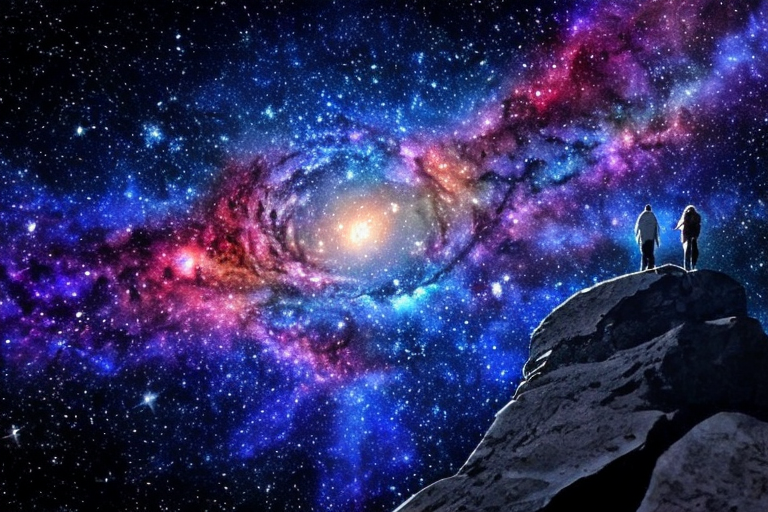
Amidst this, we frequently look outward, seeking things that capture our interest, soothe our spirits, or transport us to new experiences. However, our scientific explorations have revealed a profound truth: the universe is not designed to nurture life or consciousness; these phenomena are mere happenstances. The search for a cosmic embrace is understandable but fundamentally misaligned with the universe’s indifferent nature.
Yet, recognizing our place in this vast cosmos only magnifies the wonder of our existence. Imagine altering a single parameter at the moment of the Big Bang—such a minute adjustment might exclude not only us but all we hold dear from the cosmic narrative. If a superintelligence were to assess the universe post-adjustment, it might find no significant difference from its original state. However, for us, the change would be absolute—there would be no ‘us’ to observe the difference. This perspective shift, focusing away from minute details towards broader cosmic patterns, underscores the transient nature of our existence. Our lives hinge on precise and unlikely configurations of particles, shaped by the laws of nature and chance, making our presence both rare and extraordinary.
Reflect on Richard Dawkins’s notion of an almost infinite array of potential humans, each with a unique sequence of DNA, none of whom will ever exist. Consider the myriad moments from the Big Bang to the present, each filled with quantum events that could have led to myriad alternative realities, each as coherent as our own but devoid of our presence. The improbable reality that we do exist, with our unique genetic and molecular compositions, is nothing short of miraculous.
This realization spans every phase of human and cosmic evolution, highlighting our exceptional yet fleeting presence in the universe. It is a revelation that lends a profound appreciation for the delicate intricacies of existence, driving us to recognize and cherish the extraordinary nature of our brief sojourn through time and space.
Our unique molecular makeup endows us with remarkable abilities, distinguishing us from most life forms, which are bound to the immediate realities of existence. Unlike these life forms, humans possess the extraordinary capacity to transcend temporal limitations. We reflect on the past and envision the future; we comprehend the universe, engaging with it both intellectually and emotionally. Our remote position in the cosmos has not hindered us; rather, it has fueled our creativity and imagination, allowing us to create art, language, and technology that articulate our deepest yearnings and complex thoughts, our confusions and epiphanies, our defeats and victories.
Through our ingenuity and tenacity, we have probed the farthest reaches of both inner and outer space, uncovering fundamental laws that explain the luminosity of stars, the mechanics of light, the flow of time, and the expansion of space. These laws enable us to look back to the universe’s inception and forward to its potential demise.
Yet, such profound discoveries bring with them persistent and profound questions: Why does anything exist at all? What initiated life? How did consciousness arise? While we have speculated widely, definitive answers continue to elude us. It may be that our brains, perfectly tuned for terrestrial survival, are not inherently equipped to solve these cosmic mysteries. Alternatively, as our intellectual capacities evolve, perhaps the nature of these questions will change, rendering them obsolete. Despite these possibilities, the coherence of our current scientific understanding, grounded in rigorous mathematics and logic, suggests that our intellectual capabilities are adequately robust. We are not merely shadows on Plato’s cave wall, oblivious to a deeper truth that lies just out of reach.
As we advance towards a seemingly indifferent and inhospitable universe, we must come to terms with the absence of a grand cosmic plan. The universe’s fundamental particles are devoid of intrinsic purpose, and there is no ultimate truth concealed in the cosmos waiting to be uncovered. Rather, it is within certain unique assemblies of these particles—within us—that the capacity for thought, feeling, and reflection arises. Within these subjective realms, we forge our own meanings.
Thus, our journey to understand the human condition is fundamentally an inward exploration. This path eschews preconceived answers in favor of a deeply personal quest to forge our own meanings—a quest that is the essence of creative expression and narrative. Science serves as a formidable tool in deciphering external reality, yet it is but a part of a broader human endeavor. This endeavor is about more than survival; it is about crafting narratives that resonate deeply, narratives that echo through the void, etching stories of our existence into the continuum of time—stories that, at their best, resonate profoundly with the human spirit.
Epilogue
As we stand amidst the cosmos, a fleeting presence in its vast expanse, our quest for understanding and meaning takes on a poignant urgency. The realization that life, with all its complexity and consciousness, is but a transient occurrence in the cosmic timeline, challenges us to find significance in our brief existence. This essay, relating an odyssey across time and thought, reflects our enduring struggle to weave a narrative that transcends our mortal constraints—a narrative rich with purpose, steeped in the pursuit of knowledge, and driven by a desire to forge a lasting legacy.
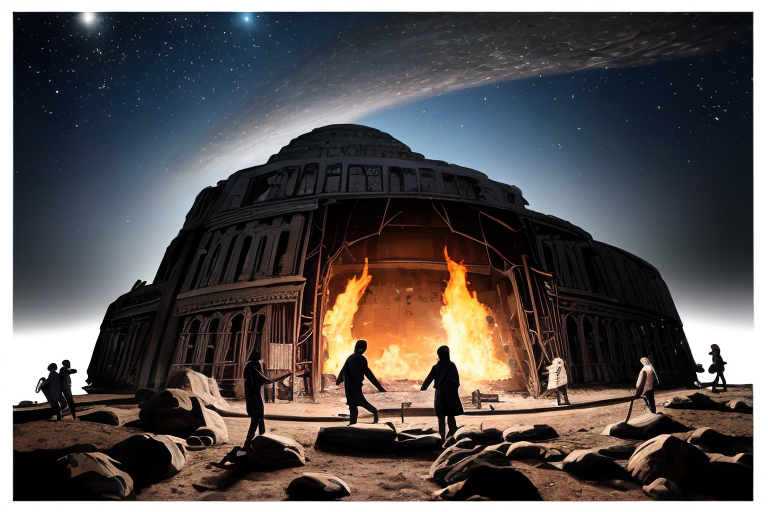
Our exploration of the universe, grounded in science yet enriched by our philosophical inquiries, reveals a cosmos indifferent to our fates yet profoundly connected to the essence of our being. In the grand scheme of existence, where stars are born and die and galaxies drift through endless space, our lives unfold, marked by fleeting moments of joy, sorrow, and triumph. Here, in the quiet reflection on our place within this vastness, we find a call to action—a call to live fully and meaningfully, aware of our limits but inspired by the boundless possibilities of our reach.
As we navigate this cosmic journey, the narratives we create and the meanings we assign shape the legacy we leave behind. It is not in the grandeur of the universe that we find our purpose, but in the connections we forge with one another, in the knowledge we pass on, and in the stories we tell that resonate through the ages. In this way, our brief flicker of existence lights up the darkness, a beacon of thought and creativity in a universe that does not pause to notice.
In the end, “Deciphering Humanity’s Quest for Meaning and Order” is more than an intellectual exploration; it is a testament to the human spirit’s resilience, its unquenchable thirst for understanding, and its profound need for connection—to one another, to the cosmos, and to the mysteries that lie beyond. In this journey from chaos to order, from the birth of stars to the complexities of human thought, we find not only the roots of our own existence but also the enduring quest for meaning that defines us as a species.







